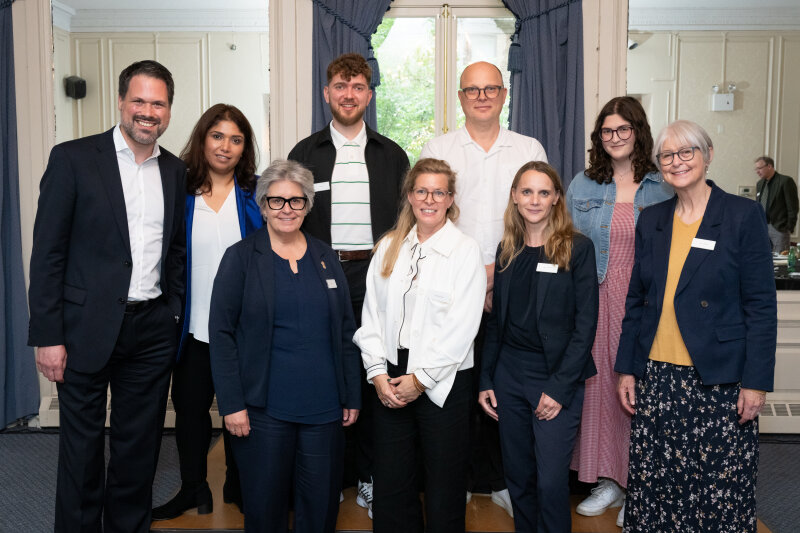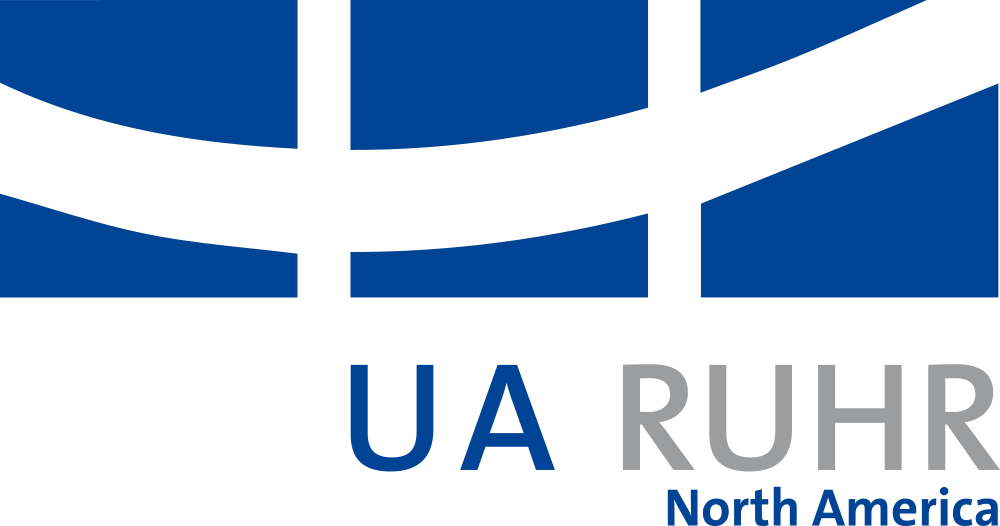UA Ruhr News Center
16. 06. 2025
#SCALEability: Transfer in Educational Research and ED-Tech in Germany and the US
New York, NY — On June 9, 2025, the University Alliance Ruhr, in collaboration with 1014 – space for ideas and the German Center for Research and Innovation (DWIH) New York, hosted #SCALEability: ED-Tech Transfer in Germany and the US at The Liederkranz in New York City. UA Ruhr’s Priya S. Nayar facilitated the session from 2 pm to 5 pm. The afternoon brought together a diverse and interdisciplinary audience of educators from both universities and schools alongside professionals from education, nonprofit, city governance, finance, funding, and business backgrounds. Together, they participated in deeply engaged discussions around innovation, collaboration, and impact in the education sector with a special focus on similarities and opportunities between Germany and the United States.
A central feature of the afternoon was a conversation-style presentation featuring:
- Prof. Dr. Bettina Amrhein (University of Duisburg-Essen)
- Prof. Dr. Tish Jennings (University of Virginia)
- Expertly moderated by Prof. Dr. Martin Ihrig (New York University).
The dialogue made it clear that the concept of scalability in education goes far beyond reach and technical innovation. It was emphasized that a meaningful scale must also involve impact, particularly in creating emotionally safe and inclusive classrooms. Amrhein and Jennings’ work addresses the goal of relieving educators from overwhelming workloads and equipping them to meet the individual needs of their students while creating emotionally safe learning environments, drawing on evidence-based programs. Through this approach, children are enabled to foster creativity, experience collaboration, problem-solving, and self-discovery, which are essential skills for personal development and growth.
A key takeaway from the presentation was that both scholars center their projects on emotional well-being, have secured funding to implement their models in real-world school environments, and are committed to long-term impact. As part of their scaling strategies, both are exploring the use of AI to extend the reach and sustainability of their initiatives, recognizing technology as a tool to support educators and improve learning outcomes at scale:
- Prof. Amrhein's Umbraise program is scheduled to be implemented in 1,000 German schools between 2025 and 2027, with support from national grants.
- Prof. Jennings's CARE program has already been funded, implemented, rigorously evaluated, and replicated through support from the US Department of Education. She is currently leading a team developing "Marzy," an AI tutor designed to support educators and students, which will soon begin pilot testing.
The afternoon concluded with interactive roundtable discussions led by Dr. Kathrin DiPaola (1014) and Dr. Jan Lüdert (DWIH New York), which focused on two central themes: Innovation Processes: Principal Investigators & CEO and Funding: Opportunities & Barriers. Building on the earlier presentation, the roundtables explored shared challenges and opportunities for the transfer of education research and ed-tech. From a funding and innovation perspective, discussions underscored the necessity of a clear business plan with strategic positioning within networks, a well-defined product niche and product, cross-sector partnerships, including collaborations with existing companies in the ed-tech sector, and a credible exit strategy. These elements were identified as essential to attracting long-term investment and achieving sustainable, scalable growth.
The event also underscored the value of transatlantic cooperation. Through their reciprocal research partnership and active knowledge exchange, Amrhein and Jennings demonstrate how German and US schools can mutually benefit from shared insights. Despite national differences, both are confronting similar structural barriers within their school systems—including a shortage of facilitators, limited infrastructure for ongoing educator support, and the challenge of finding a sustainable business model to scale and effectively embed innovation. In addition, both are navigating the dual role of being a Principal Investigator and CEO, finding a balance between academic research and the entrepreneurial mindset required to implement and scale their innovations. Their ongoing collaboration is enabling the exchange of best practices across borders, helping to address individual and systemic challenges through shared lenses.
Participants included Prof. Dr. Karen Shire, University of Duisburg-Essen; Prof. Dr. Kurt Becker, Emeritus Vice Dean for Research, Innovation, and Entrepreneurship at NYU Tandon School of Engineering; Dr. Nina Gray, Associate Vice Provost for Research at NYU; Dr. Joann Halpern, Adjunct Professor of International Education at NYU; Prof. Dr. Sven Horak, Zizza Tobin Professor of Management at St. John's University in New York; David G. Di Gregorio, NJ School Administrator; as well as representatives from Overseas Press Club of America, Columbia University, Morgan Library, Cornell University, University of Buffalo, CUNY, Mindful Philanthropy, NYC Dept. of Education, NYC city government, and more.
To view photos from June 9th, please visit our photographer, Nathalie Schueller's link: https://nathalieschueller.smugmug.com/Official-Events-2025/UA-Ruhr-SCALE-ABILITY-Talk-and-Networking-Event-June-9-2025/n-FBjKQX. If you would like to request digital copies of a particular photo or photos, please contact us at intern@uaruhr.de with the file name/s.



